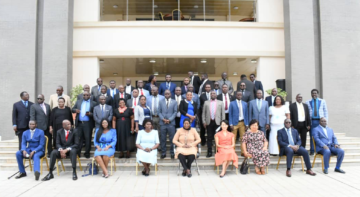Blogs

In any country, parliamentary oversight is one of the foundations of its democracy. In a nutshell, it is a way of holding the Executive arm of government accountable for its actions and ensuring that policies are implemented in accordance with the country’s laws. Additionally, this constitutes part of the monitoring and evaluation (M&E) process, which helps to assess the performance of Parliament as well as its technical staff. As with most democracies, Parliament has the power to oversee the government through a number of mechanisms, including committees. Unlike plenary sessions, committees provide a platform for issues to be discussed in a smaller forum, thus… Share on X Committees within the Parliament of Malawi are established either by the Constitution, an Act of Parliament or through its Standing Orders.
Under the Malawi Parliament Enhancement Project(MPEP), the Parliament of Malawi and the African Institute for Development Policy (AFIDEP) conducted a two-day workshop on “Facilitating effective committee performance“ between 1-2 December 2018 in Salima, Malawi. The aim was to review and adopt effective strategies and practices in strengthening committee performance in the Parliament of Malawi. The idea of the workshop was informed by a Needs Assessment of the Malawi Parliament conducted in January 2017, which highlighted key areas of need for strengthening committee functions. Specifically, the needs assessment recommended: a definition of the roles and objectives of committees in conducting oversight and the review, monitoring, and supervision of government and public agencies, providing adequate training to committee clerks on how to conduct effective public hearings, and strengthening the role of national assembly committees, among other factors. Strong committees, with the capacity to monitor the Executive and hold it to account, are a necessary condition for effective parliamentary influence in the policy process and ensuring a democratic system of checks and balances.
Why monitor committee performance?
The Malawi Parliament has 20 committees comprising of Members of Parliament (MPs) from different political parties, appointed to handle issues assigned to it by the House. For this workshop, however, we were unable to get clerks representing all 20 committees. Instead, we had clerks representing the research, finance and legal sections, the Policy and Planning Department, the Public Appointments Committee, the Transport and Public works Committee and the Social and Community Affairs Committee.
Experts from South Africa and Uganda Parliaments were brought in to share lessons on what has worked for them and how to improve the performance of the Malawi Parliament. The Malawi Parliament’s Strategic Plan was emphasised as a guiding framework for effective committee performance.
One would ask why it is important to monitor and manage the performance of committees. This is in order to gauge how Parliament and committees are faring and get best practices for incoming members. Moreover, the management of performance also helps assess if objectives are being met, promotes credibility by reporting on results of committees while guiding leadership to correct weaknesses. The guiding principle is that there is a need to strengthen accountability when developing the Malawi Parliament’s Strategic Plan, which is currently undergoing review and that mechanisms for reporting are clear. The 20 Parliamentary committees through which the institution can scrutinise how it exercises its key functions of legislation, oversight, and representation, are critical to monitoring performance. Moreover, the work of committees is undertaken by about 172 members, most of whom are on more than one committee, with broad mandates that stretch beyond the portfolio of a single ministry.
Challenges versus lessons learned
During this capacity development workshop, committee clerks were asked to prepare performance scorecards for different departments for the last 2 years. It was noted that for Malawi, there was a document outlining guidelines for evidence use in Parliament, which had been developed by the Research Committee but there was no indication of how much uptake of evidence the MPs had done. This gap provides an opportunity for the MPEP initiative to support the research department in assessing the use as well as the impact of an evidence-based approach to decision making.
In Uganda, some of the challenges that were outlined included there being inadequate human resources for M&E, inability to use results for learning, high expectations from external stakeholders, as well as the problem of the measurement system being too focused on outputs rather than on outcomes. Similar challenges were shared from South Africa to include: a lack of interest to undertake inquiry on matters that have potential of opening up factional cracks within the ruling party, delays by the table section that serves to review and advised the Speaker on Parliament motions and reports in following up on House resolutions, as well as delays in considering reports tabled in the House and in filling vacant positions, especially those that have a critical function.
Key lessons from this workshop included the need for operation of committees to be guided by the M&E function and pointed out the importance of timelines and the level of rigor. Specifically, in Uganda, the engagement of all stakeholders in Parliamentary committees greatly influences the outcomes of performance measurement and there is an emphasis on a culture of Parliament as an evaluation institution. In South Africa, the legislation of committee activities such as processing of bills has demonstrated that it compels committees to perform and report accordingly. This also enhances strategic and annual performance plans, as well as departmental annual reports to draw recommendations for budget review. Further, rules of the National Assembly mandate the committees to consider and report on matters referred to them by the Speaker of National Assembly, thus holding them accountable.
As part of the next steps, committee clerks developed recommendations for committee chairs to consider, during a follow-up workshop for committee chairs a week later. The workshop with committee chairs would discuss the achievements of committees, the challenges undermining their performance, lessons from other African Parliaments, opportunities for improving committee performance, M&E tools for committees, and suggest ways to improve committee performance. Looking at the Malawi Parliament, the fact that chairpersons remain in their position for the entire five-year term of government administration was seen as a weakness in enhancing efficiency.
Moving forward, there is a need to prioritise a special orientation for chairpersons soon after being elected, thus aligning their goals with that of the committees. Other examples of what works include emulating the legacy report system of the South Africa Parliament, which is used for handing over committee work-plans, and a structural analysis which provides achievements of previous Parliaments and outstanding issues to new members. In terms of capacity building, Parliament staff are encouraged to join networks and professional bodies as an opportunity to learn and enhance their skills. In order to enable a feedback mechanism within Parliament, it was recommended that the process of sharing information be formalised with set procedures of work for instance regularisation of Parliamentary caucuses.
*A parliamentary caucus is a group consisting of members of the same political party or a fusion of parties in a legislative assembly, with a common goal. For instance, the Malawi parliament has the Women’s Caucus and Population Caucus just to mention a few.
Related Posts





